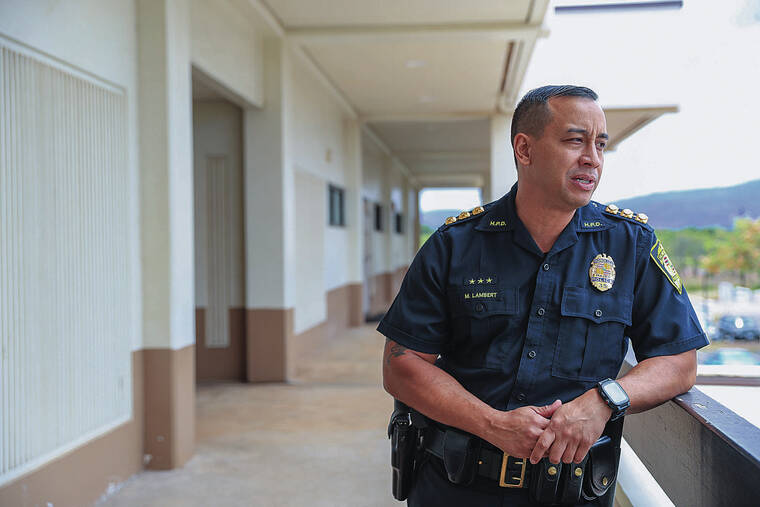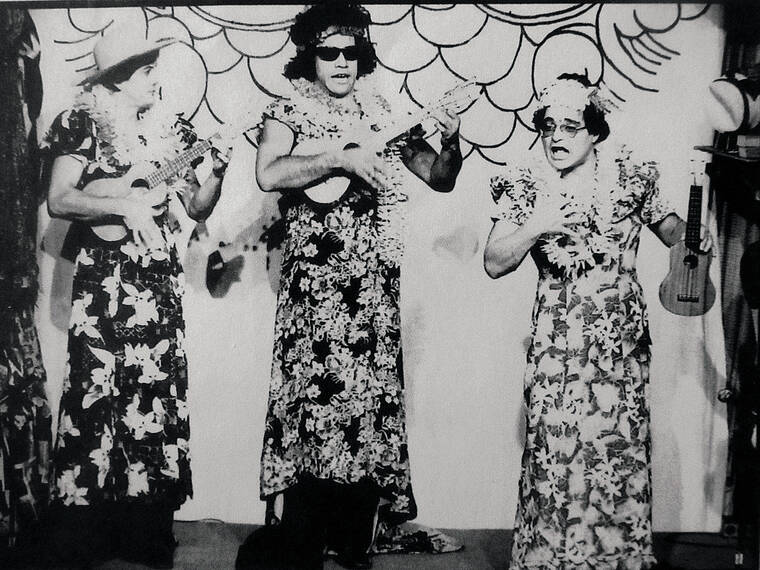Honolulu police major Mike Lambert, homeless outreach program featured in AAPI documentary


MARCO GARCIA / SPECIAL TO THE STAR-ADVERTISER
Mike Lambert and HONU were profiled nationally in “AAPI Heritage Heroes,” an hourlong documentary presented by The Asian American Foundation.


Growing up, Mike Lambert’s friends knew that his father was an officer with the Honolulu Police Department. When one of them decided to join the force, he asked Lambert to get an application form from his father. Lambert’s father gave him an extra “in case he screws up on one,” and the friend challenged Lambert to use the extra form to apply as well. Lambert took the challenge and was accepted. His friend became an electrician.
Twenty years later, Lambert, 42, is an HPD major who heads the training division and also runs programs that help homeless people on Oahu. HPD officers are often the first responders to citizen complaints about homeless people and their behavior. They often find themselves caught between public demand that public spaces be cleared and groups such as the American Civil Liberties Union, which advocates for people’s civil liberties.
Traditional responses have been revolving-door incarceration, a bed in a homeless shelter, or relocating homeless people from one location to another. In 2019, Lambert introduced the Homeless Outreach and Navigation for Unsheltered Persons (HONU) program as an alternative.
HONU sets up a large tent with hygiene facilities for three months in a public park; the program rotates to a different city park every 90 days. Small tents inside the large tent provide individual privacy and 24/7 short-term shelter along with on-site access to social services.
Lambert and HONU were profiled nationally in “AAPI Heritage Heroes,” an hourlong documentary presented by The Asian American Foundation.
The special, which premiered in May on Hulu in honor of Asian American and Pacific Islander (AAPI) Heritage Month, highlights six individuals from across the U.S. whose impactful stories focus on resilience, service and courage. Those featured were nominated by family, friends and community members; Lambert said his nomination came from a staffer in Gov. David Ige’s office. Each story was directed, edited and produced almost entirely by AAPI professionals.
Don't miss out on what's happening!
Stay in touch with breaking news, as it happens, conveniently in your email inbox. It's FREE!
Hosted by Daniel Dae Kim and Lisa Ling, the film features several other AAPI celebrities sharing their experiences including Auli‘i Cravalho, who introduces Lambert’s segment.
For more, see taaf.org/aapi-heritage-heroes Opens in a new tab.
Let’s start with HONU. What is it, and how does it work?
It’s a diversion program that allows individuals experiencing homelessness the opportunity to improve their situation prior to enforcement. Our police department has always been caught in the middle of public opinion. My idea was, why don’t we just support both? Why don’t we, prior to enforcement, offer services?
Each profile in “Heritage Heroes” is directed by someone from the same ethnic community as the person being profiled. For your profile, “Kuleana,” the director was Alexander Bocchieri, who is Native Hawaiian. How did that work for you?
It was pretty cool because it’s the first time I’ve ever done it, but Alex was awesome. He really made me feel at ease, and because he was also Native Hawaiian I never felt insecure about trying to share because I know he got it. When we started to get into kuleana and how I feel about things, I knew he got it.
I noticed you translated kuleana as “Everyone matters and everyone has a role in the community.” That is a new translation for me. Where does it come from?
When I went to Kamehameha Schools, it’s one of those fundamental things you learn. Obviously the direct translation is “responsibility,” but it’s more than that. It’s your responsibility in this environment, in this community. Everybody has a kuleana to each other and responsibility to each other. At Kamehameha Schools, what they really drove was kuleana in regards to the community.
How can the public support HONU and the related HPD programs?
The biggest way to help is just to embrace when it comes to your neighborhood. The people that enter the program have made a choice to improve their situation. This is the first step into their recovery. HONU is not meant to enable, it’s meant to empower. That’s the point. And that’s what I want the community to understand.
We’re hearing more frequently about people on the mainland who refuse to pull over for traffic stops, people who physically confront officers, people who shoot at police officers and people who run when police tell them to stop. Are we seeing more of that in Hawaii?
Has there been any increase? Yes. Is it out of control? No, in my personal opinion. We have between 800,000 and 900,000 interactions per year, calls for service, and I think we only used force (of any kind) 2,600 times last year. That’s a very small percentage. My advice is let us do our job, and we’ll settle it in court. Nowadays in the mainland, for whatever reason, there’s a tendency for people to want to have “street court.” The reality is that you can’t win the argument in street court.




